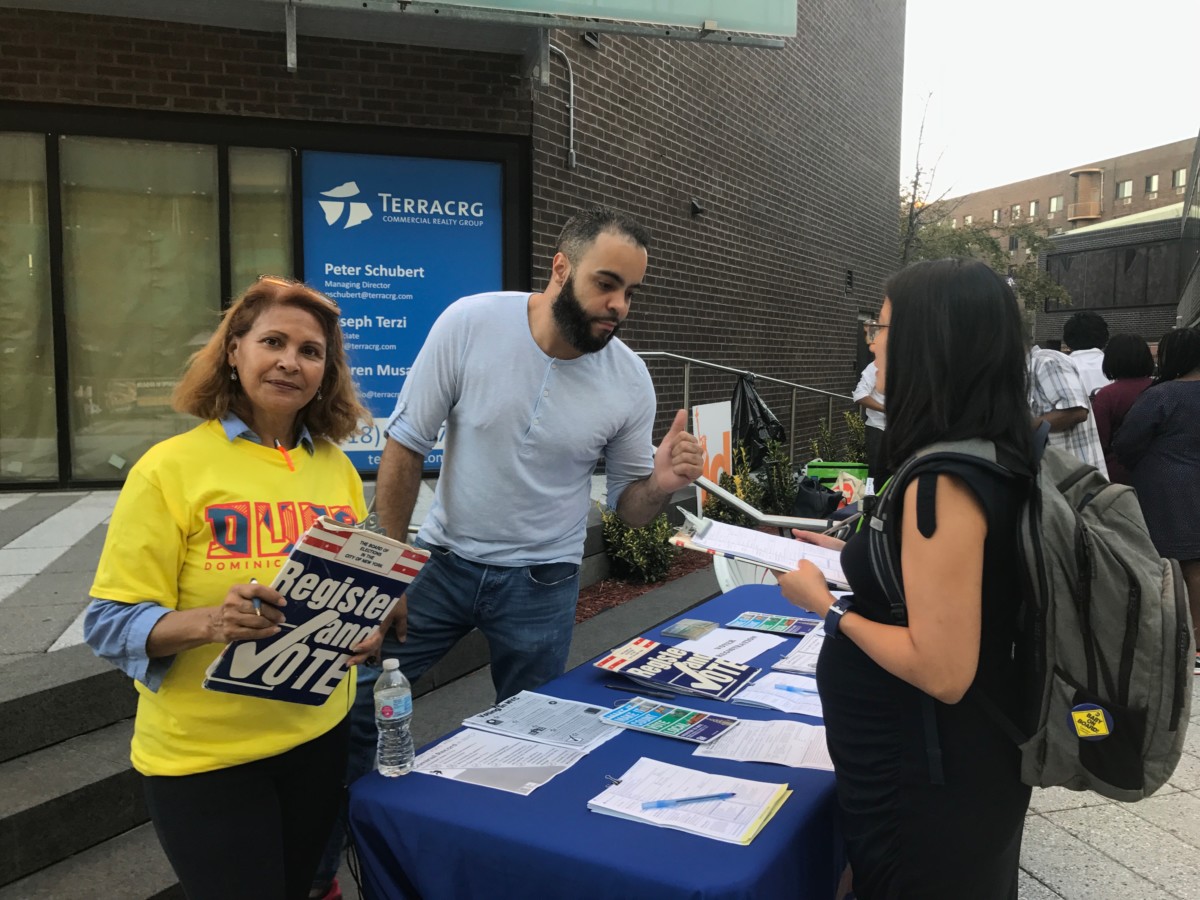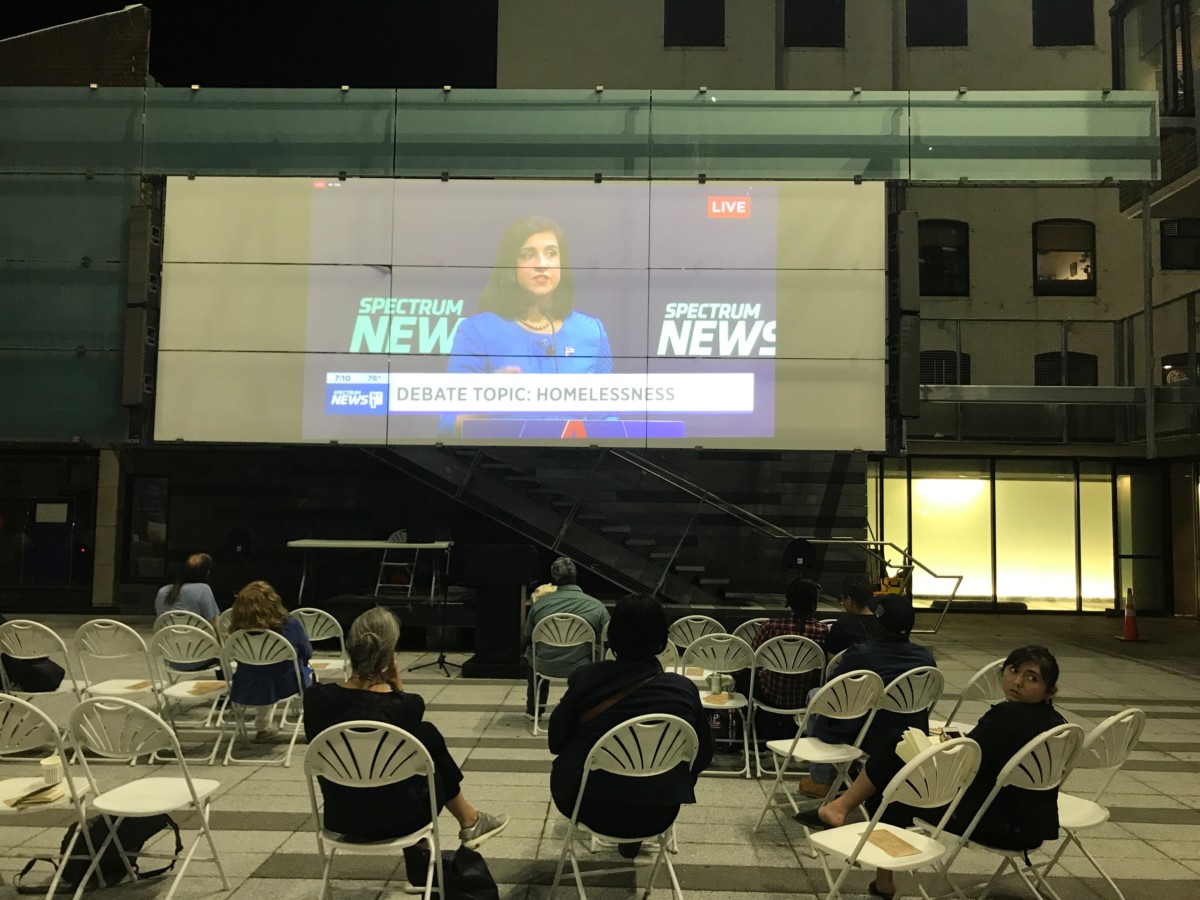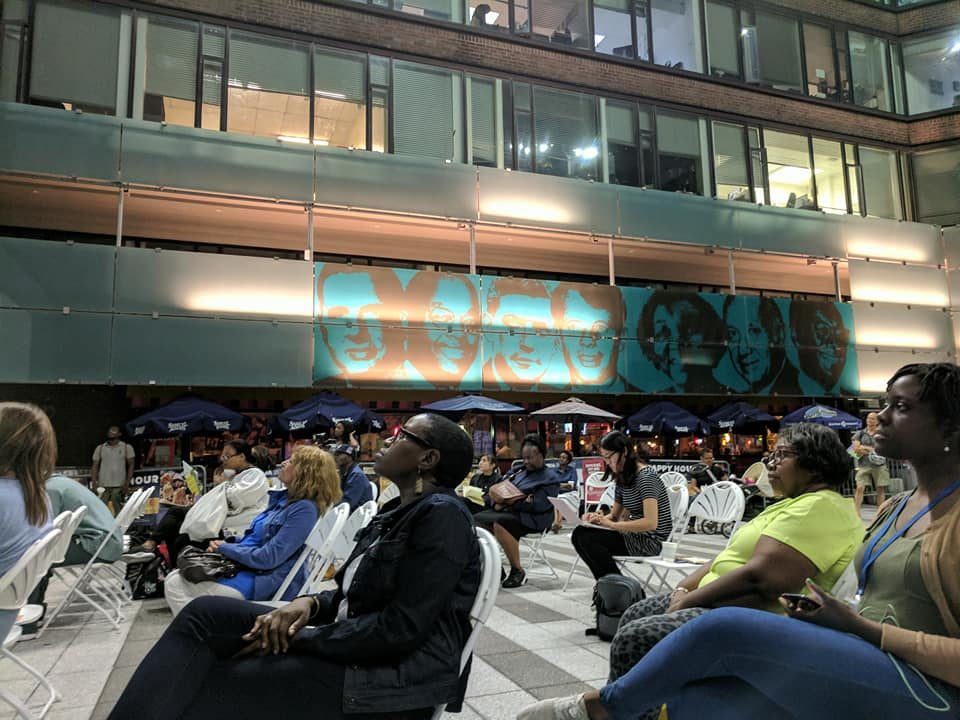One woman showed up with a red grocery cart. Another left when her son came. At first, more people preferred sitting on the side of the plaza or standing in the back than in the chairs facing the big TV screen. At 7 p.m., when the live streaming started, only about a dozen people sat in the four rows of white plastic chairs in front. But most of the seats were filled by 8 p.m., an hour after the debate began. This was a debate among the candidates for mayor of the city of New York, and some citizens clearly wanted to see it.

The mayoral debate watch party on October 10—in the Restoration Plaza on Fulton Street in Bed-Stuy—was co-hosted by Transportation Alternatives and New York City Votes. It started at five, when visitors could register their votes with Dominicanos USA and enjoy food from Dunkin Donuts and Gorilla Cheese. The debate itself was live-streamed by News NY1 starting at 7 p.m. The candidates—Mayor Bill de Blasio, Republican State Assemblywoman Nicole Malliotakis, and independent Bo Dietl—hammered away at each other, on topics ranging from homelessness and income inequality, to budget and management, to transit and crime and policing. Malliotakis and Dietl both attacked de Blasio fiercely, and the mayor shot back.
The people in the Plaza watched, quietly but attentively. Austine Martinez from Dominicanos USA, a nonprofit organization in the Bronx encouraging civic engagement, was handing out flyers in front of the plaza. His colleague, Elizabeth Batista, in a bright yellow shirt, was holding a board saying ”Register and Vote.” She said she has been working to register voters since 2014. Later, an hour before the debate, the two were at a table next to ID NYC’s, handing out voter registration forms that they would later turn in to one of the borough election offices at 200 Varick.

Diane Butler and Tamika Butler, aunt and niece, came to the watch party at around 6:30 p.m. They weren’t sure what the event was about at first. Tamika, who was eating a donut, saw advertisements of News NY1 on the big screen and asked, “Is this about Spectrum?” But Diane, who was wearing a dark blue scrub from work at a clinic nearby, soon picked up on the nature of the event. She said she “happened to like de Blasio,” because “all those politicians, all their stories and all these promises are kind of similar. De Blasio is doing all he can.”
Gloria Alleyne and Glenn Richardson, who were sitting together two rows in the back, were also among the early arrivals. Richardson was showing info about the debate on his phone to Alleyne. Richardson said he learned about the watch party on Facebook, and he didn’t want to go to the live scene because “it’s too much crowd and too much press. I don’t want the show; I just want the information.” When asked if he and Alleyne were husband and wife, they both laughed and Alleyne exclaimed: “I met him tonight!”
Alleyne, 68, who lives a block away from the Plaza, said she hoped to hear the candidates talk about immigration and health care. When she learned that Malliotakis was going to attack de Blasio’s policies on illegal immigrants, she said: “The undocumented immigrants, they are scared. They are afraid to walk out and do stuff for fear of being kicked out. It’s like being trapped in a prison when there’s no prison. They aren’t doing the bad stuff here.” Alleyne wanted to see the mayor of New York “hold and protect the immigrants all across America” and stop “tearing families apart.” She said she works as a home health aide, and sees a lot of people in need of affordable health care. The politicians, she said, “need to figure that stuff out and help those people in need. Trump only helps himself. He is all about himself.”
Richardson, 60, came from Downtown Brooklyn—where he works for Housing Works, a nonprofit healthcare organization—to watch the debate. He roots for de Blasio and also reacted strongly against Malliotakis’ take on immigrants: Immigration? he said, “This is what New York is!” Richardson said he disliked the gentrification and changes happening in Brooklyn, because he doesn’t want it to “look like Manhattan.”
“If the white people come in and be a part of the community, that’s fine. But if they come in and change it, it’s not,” said Richardson. He remarked on the other two candidates: “They both just have commercial foundations, but not community foundations,” he said. “Most of the past administrations have not put a base down for the lower rungs of the economy.” When de Blasio said in the debate that his administration had made New York the safest big city in America in the past four years, Richardson clapped his hands and cheered.

Sharon Givens, a Bed-Stuy resident for more than twenty years, was at the post office in the back of the Restoration Plaza, picking up a money order, when she saw the watch party. She is an assistant teacher at a public school in Green Point, she said, and she praised de Blasio for one thing: She is getting her United Federation of Teachers union raise and back pay because of him. Bloomberg didn’t approve it, she pointed out. “It’s not much,” she said, “but it’s a raise.”
However,Givens expressed a pessimistic general attitude toward the politicians and the trends in Bed-Stuy. “You see a lot of energy from those candidates, but there won’t be any changes in the end. It’s kind of discouraging, especially for people of African descent.” When reminded that de Blasio’s wife is an African-American whose family had lived in the West Indies, like many of the residents in Bed-Stuy, Givens said, “Right, but she won’t have much power. Maybe she can talk and influence him.”
Givens said she wishes to see more free after school programs, and more affordable housing. “There are a lot of new development and condos going on, but affordable for whom? People of color should be able to afford them.” She is also concerned about employment opportunities for young adults in the neighborhood: “My daughter is graduating college with a culinary arts major this year. She pushes herself very hard,” she said. “But many young people in this neighborhood don’t have that kind of experience and opportunities, you know? And they turn to McDonald’s and places. My daughter said the employers are looking for experience, but how can you get the experiences if you couldn’t get hired in the first place?”
People remained generally quiet during the debate, sometimes exchanging a smile or a look of disagreement, as when Malliotakis said that de Blasio had failed the working class of New York.
Marco Conner, legal director for Transportation Alternatives, who lives in Bed-Stuy, said the event was hosted in the hope of “showcasing public plazas “and “bringing the community together to engage in the election process and exercising their first Amendment rights.” He said he wished there had been more time to prepare, and more local food vendors. Maybe next time. On Nov. 1st, Transportation Alternatives will host another debate watch party at Diversity Plaza in Queens.
(Featured photograph on top courtesy of Transportation Alternatives)


Leave a Reply